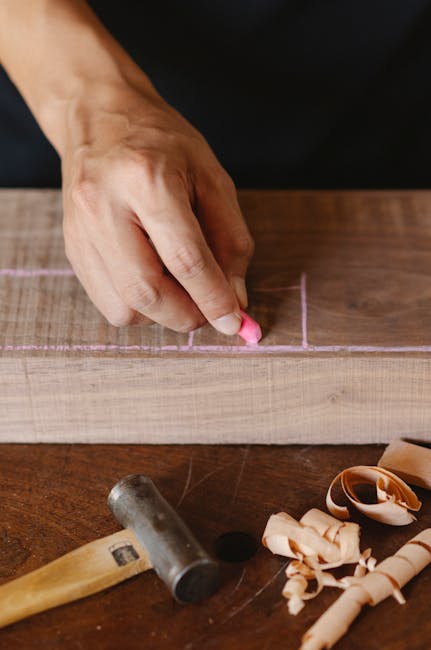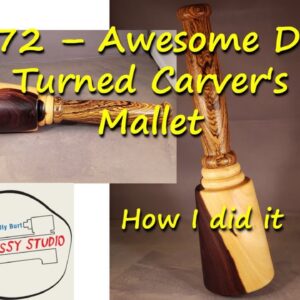Welcome back. Since I'm working on a new workbench I thought I might as well finally get around to turning me a
carver's mallet because I need one from time to time. I've been using a leg off
of a bed for a while so what I'm going to do is I'm going to take this piece of
Texas Ebony and I'm gonna cut right here. And I'm going to use this piece so it'll
be largely sap wood, but it'll have some heartwood up at the top. See it's a lot of
heartwood over there. So this will be the top. It's not gonna be the whole mallet,
but… because that would just waste too much of this Texas ebony. And I'm not
going to do that. So this will be the head of the mallet and for the handle
I'm gonna take this piece of a Bocote right here. And that's what I'm going to
make the handle out of. And I'll use a mortise and tenon to hold it in place. Won't be a through mortise-and-tenon but it will be a mortise-and-tenon and it'll glue up nice.
So let's go. Alright I've got these two
pieces roughly milled. This will be the handle. This is gonna be the body. It's
going to be a roughly three inches wide at the top.
Probably… I don't know, two, two and a half at the bottom and I'll have a handle on it. So… yeah it's a little big, but I don't know
where I'm going with it yet shape wise. Let's get at her. I really only need this
about this long. And I don't want to waste as much of this stuff…
Or this
Texas ebony. I can use this for something else, so I'm going to take
that to the bandsaw real quick. That's a problem you run into sometimes when the grain runs two directions in the same piece of wood. If I get this to cut clean, this tears out.
If I get this to cut clean. this tears out. So, (let's) see if I can stiffen these fibers
up on this side with some shellac. See what happens. The problem I'm having is
that the grain is running at a bias. You can see from this figure the grain
direction. What that really means is when you're turning it, regardless of the
direction that you're moving the tool or the cut line or the cut direction, one
side is always going to be cutting with the grain, downhill and you'll have
supported fibers. This also means that when the other side comes around and
you're cutting your now cutting uphill against the grain and the fibers are
unsupported. Give that a trans… a chan… I doused it good so I'm gonna give this a chance to dry and I'll be back.
See, the tearout's not so bad there.
(It) got really bad there. This dual brain direction is really a
booger bear… a booger bear! I really hate resorting to this but…
40 grit gouge. Man, this Texas ebony is hard stuff! Got one little spot right
there and one little spot right there where those go together. I may not be able to… well, if
I stand here for six hours I can get it. But I'm getting ready to call this close
enough for the girls I run with. By cracky that dood it. Almost! But I'm not gonna worry about
that. I don't know why I didn't think of this
earlier. This is called a beading and parting tool.
I'm doing a bead. Got this dang Exile song stuck in my head. And that's why it's called a beading a parting tool. (singing) Yeah I still need to do something about
some of that. But this is good now… mostly. This ain't.
Crap! Back to the 40 (grit gouge). Smooth that back up and go through the
grits again. I'll be back when I get this sanded. Now for the stuff dreams are made of. Look at that Texas ebony pop. Would you look at that?!? Man I like this Ack's! Now the restoring
polish, let's see what happens. It's gonna be a shame to beat on this.
But I know it's hard enough it'll take it. I've still got a few sanding
scratches in there, but I don't care.

It's for me. If this was something I would
sell… I was selling I would make sure it was perfect because I hate tool marks and
sanding scratches. Let's chuck this up. I'm gonna drill a hole in it about that
deep and that me in a tenon on here to correspond. Can you see that chatoyance? Let's do it like this. Man that's pretty!
The reason that I bring my tail stock up to hold it instead of using my hand
is because I recenter it in here and when I tighten it down I know it's gonna
run central.
If you do it by hand, I don't care how
good you think you are, you'll be off. Not always but very very many times. One inch…
that'll do. I think I want to go to about right there.
About 400 rpm. Look at that pretty stuff. Okay, I'm done
with this… for now.
So put the handle between centers and get busy. Oooohh, look up pretty that Bocote is. A peeling cut. Because it peels. I'm moving my whole body, not my arms. It's that lathe dance. Move your whole body. You start off with your weight on the right…
I'm starting off with my right on my weight on my right foot… introduce the tool, make the cut… gradually shift my weight to my left as I move my body… and now my weight's on my left foot. Doesn't matter if you're using a skew, bowl gouge, roughing gouge, spindle gouge… if you're not doing the lathe dance you're not
going to have the right kind of control.
Mark my depth here. Okay, I marked this
for the tenon because this is the straightest grain and I want pretty straight grain in
the tenon for strength. And then I will shape the handle. This is almost the
right diameter up in here, but it needs to come in
right in here and I'll probably put a bead. A little too loose, but that's just at
the beginning so I'll tighten that up a little… but it might be just about right for the glue joint. Perfect! That's gonna be purdy! I like that diameter. Turn the dust collector on. Billy, why aren't you gonna burn any
accent lines into that handle? Really?!?
Would you look at that grain? Why would I want to screw that up?!? Dat's purrdy! Pretty! Wow.
Well, it's on there.
I had a little hydraulic compression keeping it from going in, but…
it's in. It's got a good feel to it. I think this will serve me for some time
to come. Somebody that saw the pictures of the
rough turned pieces said this is too pretty to use. No such thing. So what do you think? I like it. So thanks for watching! I really
appreciate it! My next project isn't really a project of mine per se, it's
going to be a collaboration effort. Jen at Jen's Woodworking and Things
cast a resin bowl… resin and wood… that was given her a lot of fits. Largely because
she didn't have the right tools to do it. And partly because there's a mixture of
side and end grain throughout this thing and it was just kicking her butt. And
there are some bubbles in the resin. So she asked me if I'd be willing to…
she
threw it in a naughty bin and then asked me if I would be willing to give it a
look and see if there was anything I could do with it. So that's what we're gonna do next time. I'll figure out what I want to do with this… how I want to mount it. She had it on a faceplate. I may not. I don't know yet. And I'll see if I can
make something out of this without blowing it up and then I'll send it back to her.
Y'all come back..

